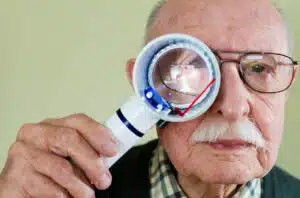Vision loss is a significant concern for people with diabetes. Diabetic patients are at a higher risk of developing eye conditions, one of which is macular degeneration. Managing eye health is an essential part of overall care in people with diabetes. This blog aims to help you understand the connection between diabetes and macular degeneration…
Age-related macular degeneration
Protecting Your Eyesight: How to Manage Macular Degeneration with Diabetes
If you have diabetes, it’s important to know the problems it can cause. You may already know about heart disease and nerve damage, but another problem is macular degeneration. It happens when a part of your eye called the macula gets damaged over time due to uncontrolled glucose levels in the body. In this blog,…
Treatment Options for Macular Degeneration in Diabetic Patients
Macular degeneration is one of the leading causes of blindness worldwide, and diabetic patients are at a higher risk of developing this condition. This condition occurs when the small central portion of the retina, called the macula, deteriorates, leading to vision loss. Diabetic patients are at risk due to elevated glucose levels that can damage…
Causes of Wet Macular Degeneration
Macular degeneration is an eye disorder that occurs when the small but important area in the retina called the macula gets damaged. The macula has a number of crucial functions, including processing sharp, clear, straight-ahead vision and most of the color vision. Damage to the macula can cause blurry vision, blind spots, visual distortions, and…
How Wet Age-Related Macular Degeneration is Diagnosed
Age-related macular degeneration (AMD) impacts the sight of millions of senior Americans. Wet AMD is more serious, causing sudden vision loss. Early detection at your eye center in St. Louis is key to preserving sight. Learn here how ophthalmologists diagnose wet age-related AMD and how treatment offers real hope. Your Wonderful Retina Its location of…
Reasons You Should Visit an Eye Clinic
Our vision can begin to slightly deteriorate due to age, overuse, or a medical condition. People who are in professions whereby they read or work at a computer all day can develop nearsightedness (when things up close are clear, but things farther away are out of focus), whereas people who are in other professions and…
Age-Related Macular Degeneration Prevention and Treatment
Age-related macular degeneration is one of the leading causes of vision loss in people over 50 years old. This eye disease affects the macula, the back part of the retina controlling central vision. The macula is responsible for sending images from the optic nerve to the brain. Damage to the macula causes a blurry or…










